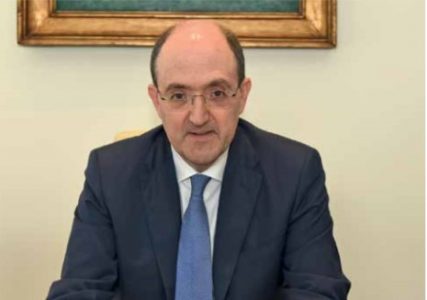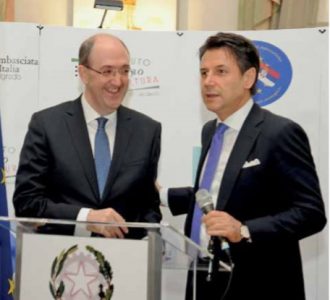Our bilateral trade exchange has been growing steadily in recent years and we have been able to reinforce our position as a key economic partner of Serbia

Italy and Serbia celebrate 140 years since the establishment of diplomatic relations and 10 years of the strategic partnership between Rome and Belgrade. In 2018, bilateral trade reached a record figure of 4.04 billion euros, confirming Italy as the second largest trading partner of Serbia. About all this and other things, the Ambassador of Italy to Belgrade, Carlo Lo Cascio, spoke in InFocus Italy.
Serbia is the first European country that the current Italian Prime Minister visited this year and the first in the region he has visited since assuming the office of the Prime Minister. How important is this to our already good relationships?
– The visit of Prime Minister Giuseppe Conte in Belgrade, on March 6th, confirmed the priority Italy attaches to its relationship with Serbia. More than simply „good neighborhood“, it’s a strategic partnership that is 10 years old in 2019, after 140 years of bilateral diplomatic relations between Italy and Serbia. Prime Minister’s visit was much more than an overall celebratory moment of the political, economic and cultural ties binding our two Countries, as it implied a fresh „re-start” of very concrete and fruitful cooperation within the framework of our solid friendship. One of his main statements was „Italy will be Serbia’s Ambassador to the EU“, meaning that we will persevere to fully support Serbia in its European path, while also continuing to encourage Belgrade to adopt and implement reforms in the interest of Serbian citizens and foreign investors and in order to speed up the accession process to the EU. Don’t forget that the visit of the Italian Prime Minister was also the first one this year of a Head of Government of EU Member State in Serbia before the European elections. In more general terms, I think that Prime Minister Conte’s visit sent a clear message to Serbia and the whole region: “we do care a lot about the Western Balkans and their European integration process and we will continue to work for that”.
In 2018, bilateral trade reached a record figure of 4.04 billion euros, confirming Italy as the second largest trading partner of Serbia. Can our cooperation be further improved and in which segment?
– We are very proud of such a remarkable achievement! Our bilateral trade exchange has been growing steadily in recent years and we have been able to reinforce our position as a key economic partner of Serbia. It shows how much our Countries can do together. We should not stop now, as – I believe – there is still a lot of room for growth. It must also be said that year by year, the Serbian economy gets more integrated into the European market, and as a consequence, our bilateral ties benefit from that. As for the specific sectors, I think that we should continue to invest both in our traditional field of collaboration, such as manufacturing and agriculture, and in new developing sectors, namely renewable energies and IT. Our business community is already working in this direction, with the full support of the Italian Government.
Italy was the Partner Country of the 86th Agricultural Fair in Novi Sad, marking 140 years since the establishment of diplomatic relations and 10 years of the strategic partnership between Rome and Belgrade. What kind of initiatives does Italy plan for this year?
– The Italian participation as Partner Country to in the Novi Sad’s Fair has been indeed one of the most relevant events of our programme for commemorating these two important diplomatic anniversaries. But it was not the only one! At the beginning of the year, the Italian Embassy, together with the Italian Cultural Institute, the Italian Trade Agency and all the other Italian stakeholders/actors in Serbia, presented a rich programme of cultural and economic events, that is now being implemented. We started in March with the “Italian Design Day”, followed by the beautiful exhibition „Bernini and the Roman baroque“ at the National Museum in Belgrade. We continued with concerts, scientific seminars and business forums. During the month of May, we hosted, together with the Yugoslav Cineteque, the Italian Film Festival. We also decided to organise initiatives outside of the capital, in Subotica, where we have an honorary consulate, as well as in Novi Sad, Sabac, Nis and Subotica. We will keep on going in autumn with the Italian cuisine week and many other events until the end of the year.

On the occasion of the fair in Novi Sad, 30 Italian companies came to Serbia. What is the potential for cooperation between Italy and Serbia in agriculture?
– Italian companies have traditionally been very active at the Agricultural Fair, also thanks to the fact that Italy has been organizing a national pavillon in Novi Sad for seven years in a row. This year our Deputy Minister for Agriculture, Mr. Franco Manzato, took part in the opening day together with Minister Branislav Nedimovic, showing Italy’s full support to the further development of the agricutural sector in Serbia and to all our companies that wish to work and invest in the Balkan region. It was definitely a great success! Our companies were very pleased with the outcome of the event. During the Fair Italian companies and institutions also hosted several seminars on innovative technologies in agriculture, circular economy and green chemestry, agricultural machinery and hazelnut plantations. These are precisely the sectors in which Italian and Serbian companies can work together to exchange know-how and better their respective productions. Small and medium enterprises, that form the core of the agribusiness both in Italy and Serbia, should invest in technology and look at agriculture 4.0 as the key for their future success.
About 600 Italian companies operating in Serbia, employing more than 26,000 workers, making it the second largest foreign employer in our country. Why does Italy invest so much in the Balkans? What are the advantages for Italy in a strategic partnership with Serbia?
– As I like to say, many Italian companies came and invested in Serbia long before other international partners. I think that we developed a special relationship, built on mutual trust, but above all on the excellent economic results that we were able to achieve together in terms of production and employment. Serbia has a lot to offer to our companies. First of all, there is a geografical aspect: the Balkans have traditionally been an important market for Italy and the Serbian economy‘s growth is attracting other investors to come. But there is also a cultural aspect that helped us forging ties with our Serbian friends. Our companies have always developed a strong local management, while also being very attentive to the social dynamics in the municipalities where they work. The outcome of this collaboration has been mutually beneficial and there is no doubt that we will continue to integrate our value chains and contribute to the stabilty of the entire region.
To what extent did the Serbian reforms influence the inflow of Italian investors into the country? Let me put it this way: more reforms lead to more transparency and better governance. They will further improve stability bringing new investors. This is not only valid for Italian companies, but it is also about the business environment in general. Serbian authorities are successfully attracting more FDIs, they have been doing a great job in consilidating the public finances and controlling inflation, as confirmed by international financial institutions. Their efforts should now be concentrated on privatizazions and the further improvement of the fiscal sector, the judiciary and the public administration efficency in general. All these sectors are also taken into account in the EU accession negotiations, the alignment of the Serbian legislation to the European one would, therefore, bring a twofold benefit: moving the Country forward on its European path and reinforce the business environment.
We know that the issue of Kosovo is the main condition in the EU negotiations with Serbia, but we have seen some of the negative pressures of Pristina such as imposing taxes, hostile rhetoric and transforming Kosovo’s safe forces into the army. What is Italy’s position on this issue?
– We attach great importance to the EU-facilitated Dialogue between Belgrade and Pristina. Stability of the Western Balkans is of the utmost importance for the whole European Continent, and a legally binding agreement on normalization between the sides is an essential element for that stability to be fully achieved and maintained in the long run. Therefore, in our view, there is no alternative to Dialogue and normalisation. This is why we have reiterated our convinced call for an immediate and unconditional suspension of the 100% tax imposed by Pristina on products imported from Serbia, which constitutes a barrier for the continuation of the Dialogue. We have appreciated Serbia’s responsible attitude in the current crisis, as Prime Minister Conte emphasized in his public statements in Belgrade. We wish this path could be maintained as Serbia continues to be a key factor of stability in the region. There are still efforts in place to resume talks between the two sides. We hope this could happen soon, thus enabling progress in the normalization of relations between Belgrade and Pristina, which is necessary also to ensure advancements in Serbia’s European path. We should not forget that Dialogue needs to be framed within the accession process: both are linked and interdependent.
What is the political position of Italy regarding the European path of Serbia bearing in mind the position of Italy towards the European institutions?
– We are well aware of the various challenges ahead for all of us: for the European Union, for most of its member states, for the Balkan region as a whole and Serbia itself. That is why we thought there could be no better time for the Head of the Italian Government to come to Belgrade. In his talks with President Vucic and Prime Minister Brnabic, Prime Minister Conte reaffirmed the staunch support of Italy to the process of integrating Serbia into the EU, while renewing our call to do more on the reforms side, in the interest primarily of the Serbian citizens. In addition to that, he reiterated our full support to President Vucic’s efforts to achieve a compromise solution with Pristina. More recently, during his meeting with President Vucic on 8th May, our Deputy Prime Minister Salvini recalled Italy’s firm position in favor of Serbia’s accession to the EU. As Minister Salvini said a few days ago: “That Serbia should become a part of the European Union is something that is geographically, socially and culturally interesting”. In our view, the reform process within the EU could go along with the integration process. And it would still make sense to enlarge the EU in order to appropriately include some nations very close to us.